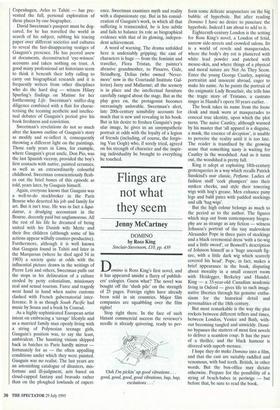Flings are not what they seem
Jenny McCartney
DOMINO by Ross King Sinclair-Stevenson, £10, pp. 439 Domino is Ross King's first novel, and it has appeared amidst a flurry of publish- ers' eulogies. Guess what? The novel was bought off the 'slush pile' on the strength of 25 pages. Foreign rights have already been sold in six countries. Major film companies are squabbling over the film rights!
Stop right there. In the face of such blatant commercial success the reviewer's needle is already quivering, ready to per- 'Ooh I'm pickin' up good vibrations . . . good, good, good, good vibrations, bap, bap, excitations . . form some delicate acupuncture on the big bubble of hyperbole. But after reading Domino I have no desire to puncture the hyperbole. Indeed I am about to add to it.
Eighteenth-century London is the setting for Ross King's novel, a London of fetid, narrow side-streets and crowded salons. Its is a world of revels and masquerades, where the body's dry rot is plastered with white lead powder and patched with mouse-skin, and where things of a physical and moral nature are Not As They Seem. Enter the young George Cautley, aspiring portraitist and innocent abroad, eager to make his name. As he paints the portrait of the enigmatic Lady Beauclair, she tells him the tragic story of Tristano, a castrato singer in Handel's opera 50 years earlier.
The book takes its name from the loose cloak and mask worn at masquerades to conceal true identity, upon which the plot turns. The naive Cautley, although warned by his master that 'all apparel is a disguise, a mask, the essence of deception', is unable to perceive the reality until it is too late. The reader is transfixed by the growing sense that something nasty is waiting for Cautley in the woodshed. And as it turns out, the woodshed is pretty full.
King is adept at exploiting 18th-century grotesqueries in a way which recalls Patrick Susskind's noir classic, Perfume. Ladies of fashion stuff 'cork plumpers' into their sunken cheeks, and style their towering wigs with hog's grease. Men enhance puny legs and bald pates with padded stockings and silk tag-wigs'.
But the high colour belongs as much to the period as to the author. The figures which step out from contemporary biogra- phy are as strange as any fiction — witness Johnson's portrait of the tiny malevolent Alexander Pope in three pairs of stockings and a black ceremonial dress 'with a tie-wig and a little sword', or Boswell's description of Johnson himself as a 'huge uncouth fig- ure, with a little dark wig which scarcely covered his head'. Pope, in fact, makes a brief appearance in the book, disputing about morality in a small concert room with Heidegger, Berkeley and Handel.
King — a 33-year-old Canadian academic living in Oxford — gives life to such imagi- native liberties through his genuine enthu- siasm for the historical detail and personalities of the 18th century.
But most remarkable is the way the plot rockets between different tellers and times, between London, Venice and Bath, with- out becoming tangled and unwieldy. Domi- no bypasses the stutters of most first novels to deliver a seamless coup. It has the pace of a thriller, and the black humour is slivered with superb menace.
I hope they do make Domino into a film, and that the cast are suitably raddled and venomous, with bad teeth. British, in other words. But the box-office may dictate otherwise. Prepare for the possibility of a string of beach-babes in periwigs — but before that, be sure to read the book.


















































 Previous page
Previous page